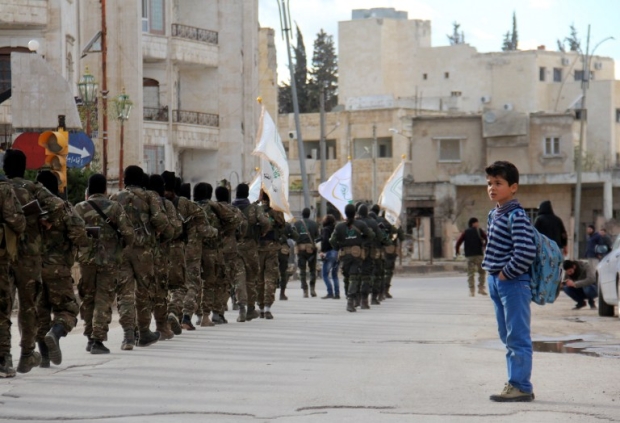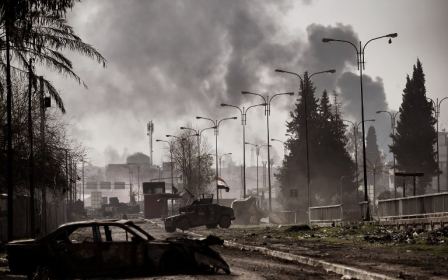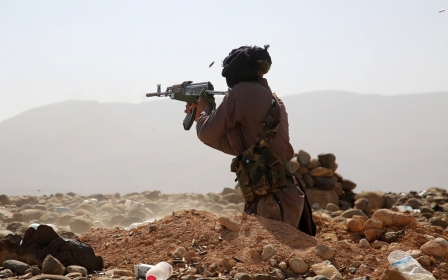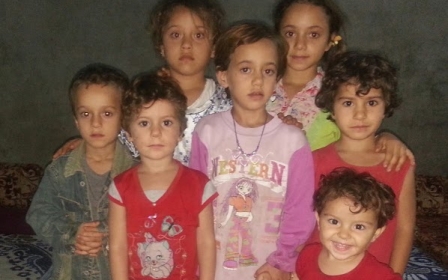How can the US recklessly kill civilians in Syria, Iraq and Yemen - and be great again?
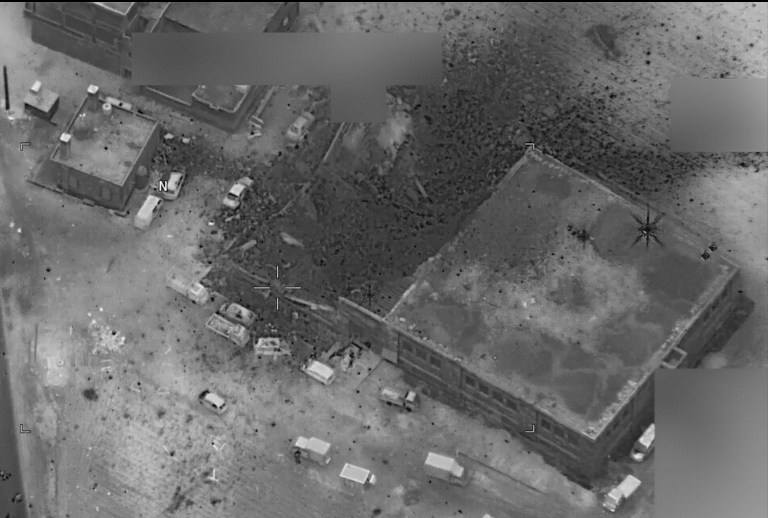
Last Thursday, a US air strike hit a mosque in the Idlib province in Syria, reportedly killing at least 42 civilians. Activists on the ground were quick to document the aftermath of the attack with footage emerging of the rescue effort and the extent of the mosque’s destruction.
It was said to have been full of worshippers who had gathered for a regular evening prayer, and according the Syrian Observatory for Human Rights, the civilian death toll may be higher with many still trapped under the rubble.
The images from sources on the ground show a chaotic scene, with volunteers frantically trying to bury through the debris to save those buried underneath.
But the US military’s Central Command denied that it had targeted a mosque, with spokesperson Col John J Thomas stating that it was a building holding an al-Qaeda meeting that was destroyed “killing several terrorists".
According to the New York Times, he also says that “there is a mosque within 50 feet of that building that is still standing”. This statement, however, is misleading. The investigative search network Bellingcat was able to confirm by way of verifying numerous eyewitness testaments, local media sources and monitor reports that a mosque was indeed targeted.
Speaking to Middle East Eye, Airwars, the transparency group monitoring air strikes against the Islamic State (IS) group, said that Col Thomas is possibly referring to a different, older mosque nearby, but the Al-Jinah mosque in question was indeed targeted and around 50 percent of it destroyed.
Civilians killed on the rise
Far from being an isolated incident, the number of civilians killed in Syria and Iraq as a result of US air strikes has witnessed what Airwars researchers have called an “unprecedented increase” since Trump took office.
According to Airwars, local sources are reporting that between 250 and 370 non-combatants were killed in Mosul in the first week of March alone. The group is still working to verify all claims, so far having confirmed that at least 71-79 civilians were killed in coalition air strikes in just seven days.
This is not to suggest that during Obama's tenure there were no civilian casualties from air strikes, but there has undoubtedly been an upsurge since 20 January. According to Airwars figures, while 2016 saw an average of 35 non-combatant deaths per month, the figure more than doubled during the first two months of 2017.
Considering the upsurge in strikes at the beginning of March, the figure for this month is likely to be even greater. Indeed, the Coalition now outstrips Russia on the number of civilian casualties killed from bombing in Syria and Iraq.
The picture in Yemen is similarly bleak as the country witnesses a rampant escalation of US military action. The first week of March was similarly relentless; the Pentagon carried out more air strikes in Yemen than it had done under any total year of Obama’s presidency.
Rather than seek approval from other senior officials and engage in discussion over strikes, Trump has shown a readiness to quickly approve a greater number of military actions. This senseless haste and lack of judgement was most clearly evidenced during the president’s first botched military operation into Yemen, when a raid on an al-Qaeda hideout resulted in the death of Navy SEAL Officer William “Ryan” Owens and several Yemeni civilians.
There was a powerful display of genuine grief by Ryan’s wife Carryn Owens at Trump’s speech to a Joint Session of Congress, which was received by a long standing ovation from Congress.
Although Trump spoke of the great sacrifice Ryan made, his death appeared to be exploited by the president to divert attention away from his own responsibility for this failed operation, framing it as “they lost Ryan”. He also failed to acknowledge the fact that innocent Yemenis also lost their lives and no apologies were given for the dead women and children.
Taken together, it speaks of a carelessness and an utter disregard for the local population, which is particularly dangerous considering that the US is already highly partisan in its involvement in the deadly Yemeni civil war. Rather than fostering trust with the local population, this will only serve to fuel further resentment and anger towards the US.'Take out their families'
But what is perhaps even more concerning is that the current policy of military escalation is coupled with a Trump request to change American obligations to follow international standards that minimise civilian harm.
This request comes as part of Trump’s Presidential Memorandum, signed on 28 January, that asks the military to formulate a preliminary plan within 30 days to defeat IS.
'When you take out these terrorists, you have to take out their families'
- Donald Trump on 'Fox and Friends' in August 2016
In the memorandum, Trump requests "recommended changes to any United States rules of engagement and other United States policy restrictions that exceed the requirements of international law regarding the use of force against ISIS".
On 10 March, more than 30 former US officials submitted a seven-page letter to US Defence Secretary James Mattis in response saying, among other things, that “the United States has always put a strong premium on minimising civilian harm in armed conflict, both because it is the right thing to do and because doing so is strategically beneficial".
Trump sees things differently, however, regarding these international standards as tantamount to a weak, “politically correct war”.
"When you take out these terrorists, you have to take out their families,” said on the Fox and Friends show during his presidential campaign.
By this logic, Nora's death was entirely justifiable. As a former senior military intelligence officer told Airwars, the transparency group monitoring air strikes against IS, “the goal is now how close to the chalk line can you get” on following international law.
The ultimate losers
But winning a war does not just depend on military might. It invariably relies on a persuasion of hearts and minds to your cause. The US, however, is now rapidly losing this war as the line dividing the enemy and the protector becomes increasingly blurred.
Rather than seeking to protect those within the countries being bombed, Trump is prioritising giving new secret authority to the Central Intelligence Agency to conduct air strikes against targets, thereby reversing Obama’s approach that put the Pentagon in charge. This will greatly limit accountability and transparency over civilian deaths: while the Pentagon is legally obliged to provide public reports on air strikes, the CIA does not.
The situation at present instead suggests a callous disinterest from Trump on the value of human life of those forced to live in these war-torn countries
This is gravely concerning considering that there is already a huge disparity betwehttp://www.iamsyria.org/six-years-of-syrian-conflict.htmlen official figures of civilians killed, and the numbers verified by Airwars. In the part three years, the Coalition has only official recorded 220 deaths; the monitoring group puts the figure at a staggering 2,590.
He also wants more boots on the ground in Syria - not to protect civilians from their principal killer, Bashar al-Assad, but with the sole mission of combating IS, despite the fact that more than 190,000 Syrian civilians have been killed by the regime since 2011, according to the Syrian Network for Human Rights.
There has already been a staggering loss of life across the Middle East as foreign powers battle out proxy wars and try to reach a fait accompli, but while there will always be collateral damage and loss of civilian life in war, the aim should always be to do everything within your power to avoid it.
However, the situation at present instead suggests a callous disinterest from Trump in the value of human life of those forced to live in these war-torn countries, a sentiment seemingly part of his wider disregard and dislike for Muslims at home and abroad.
While we should not demean those in countries bombed by the US by suggesting that they will now all respond by running off to join terrorist groups, it is nevertheless clear that Trump is perpetuating the same dangerous them-and-us narrative that violent extremists use to rally others to their cause. With so much civilian blood on its hands, how can America possibly be made great again?
- Gemma Fox is a Researcher on the Sky News Foreign Desk, having previously worked for their Documentary Unit. Specialising in Middle East politics, she has also worked for the Bahrain Institute for Rights and Democracy and is a graduate of Middle East Studies with Arabic from the University of Exeter. Tweets @gemmafox257
The views expressed in this article belong to the author and do not necessarily reflect the editorial policy of Middle East Eye.
Photo: An image released by the US Department of Defense shows what the department says was the site of an al-Qaeda senior leader meeting in al-Jinah, Syria, hit by a US air strike on 16 March 2017 (AFP)
Middle East Eye propose une couverture et une analyse indépendantes et incomparables du Moyen-Orient, de l’Afrique du Nord et d’autres régions du monde. Pour en savoir plus sur la reprise de ce contenu et les frais qui s’appliquent, veuillez remplir ce formulaire [en anglais]. Pour en savoir plus sur MEE, cliquez ici [en anglais].




